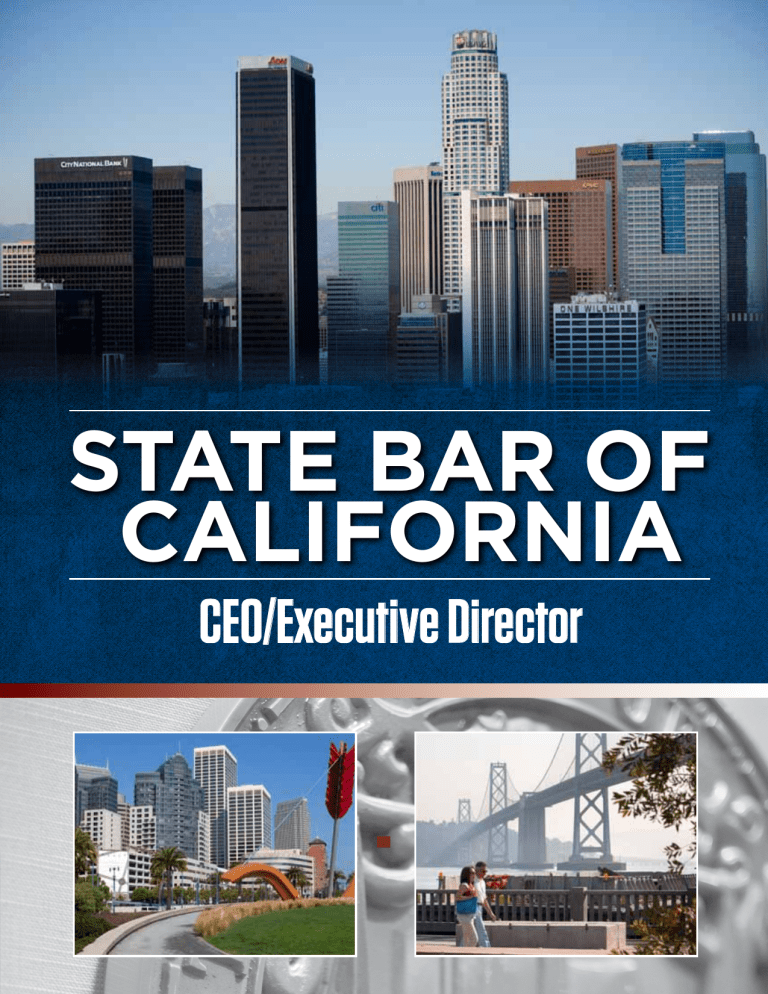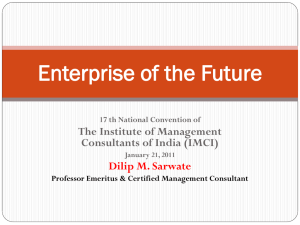CEO/Executive Director - National Center for State Courts

State Bar of
California
CEO/Executive Director
MISSION OF THE STATE BAR OF CALIFORNIA
“Protection of the public shall be the highest priority for the State Bar of California and the board of trustees in exercising their licensing, regulatory and disciplinary functions. Whenever the protection of the public is inconsistent with other interests sought to be promoted, the protection of the public shall be paramount.”
(Source: Business & Professions Code Section 6001.1.) by Legislative leaders. Six “public” non-lawyer members are appointed to the Board of Trustees: four by California’s
Governor, one by the Senate Committee on Rules and one by the Speaker of the Assembly. Each member serves a statutorily defined three-year term. The President, Vice
President, and Treasurer of the Board of Trustees are elected by the other Board members annually and serve one year terms. The Board of Trustees is the ultimate executive authority of the agency and has the fiduciary responsibility for the health and success of the State Bar.
BACKGROUND OF THE STATE BAR
The State Bar of California was created by the State
Legislature in 1927 as a public corporation. It is identified in the California Constitution as a part of the judicial branch of government, serving as an arm of the California Supreme
Court in matters involving the admission, regulation, and discipline of attorneys. The State Bar is a “unified bar,” meaning that it serves the dual purpose of being the state governmental regulatory agency for lawyers as well as the state-wide professional organization for its memberlicensees. All California lawyers practicing law must be actively licensed by the State Bar.
The following are the goals of the organization: attorney Discipline and restitution: Ensure timely, fair, and thorough investigation and prosecution of attorney misconduct, while also promoting clear communication with and compensation for victims.
With over 250,000 licensees, the State Bar of California is the largest state bar in the nation. Nearly 185,000 State
Bar licensees actively practice law in California. The rest maintain their licenses as inactive members. To practice law in California, applicants must pass the California Bar
Examination and pay their annual licensing fees to the State
Bar of California. The State Bar continually seeks to respond to the demands of a changing society in fulfilling its mission of public protection. admission to the Practice of law: Maintain rigorous admission standards and license only qualified applicants, and protect the public and consumers of legal education from law schools that do not provide satisfactory programs of legal education.
access to Justice: Collaborate with other stakeholders to ensure California’s justice system is accessible to all.
The State Bar of California is the most complex state bar in the United States with a combined budget of over $140 million and 600 full-time budgeted employees, evenly divided between the State Bar’s San Francisco and Los
Angeles offices, both of which it owns. The organization also maintains a government affairs presence in Sacramento.
Diversity and inclusion: Strengthen our commitment to diversity and inclusion in the legal profession as part of our public protection mission.
Communication with Public: Educate the public about identifying and preventing fraud, and their ability to obtain access to justice to assist them with their legal needs.
The State Bar’s operations are funded by annual attorney licensing fees set by the Legislature. The State Bar’s authority to collect licensing revenue is renewed through fee authorization bills introduced and approved by the
Legislature and signed by the Governor. The State Bar also receives non-licensing revenues including various registration and application fees, affinity program royalties, and rent revenues from its two buildings. The majority of the State Bar’s employees are represented by the Service
Employees International Union (SEIU). attorney education and outreach: Enhance public trust and confidence in lawyer competence by providing education and outreach programs that aid attorneys in practicing competently and ethically.
Collaboration with Government Stakeholders: Collaborate with stakeholders in the three branches of government to ensure the free flow of information and to solicit guidance on expectations and priorities, to achieve the mission of public protection.
Communication with attorneys: Engage the attorney community in an on-going dialogue about the mission, goals, and services of the State Bar with the aim of improving the quality and availability of legal services.
The State Bar has nearly 50 sub-entities including Sections and Committees, the Judicial Nominees Evaluation
Commission, the Committee of Bar Examiners, the Client
Security Fund Commission, the Council on Access and
Fairness, the California Commission on Access to Justice, and the Board of Legal Specialization .
Stewardship of Public assets: Maintain and enhance existing assets and manage finances to ensure transparency, accountability and fiscal responsibility, and to ensure the long term stability of the organization.
Stewardship of State Bar Personnel: Maintain a transparent, effective, accountable, and cohesive Board and management team.
GOVERNANCE AND GOALS OF THE STATE BAR
The State Bar is governed by a Board of Trustees, which has transitioned to a president and 18 or 19 members. Six Board members are lawyers elected by members of the State
Bar from statutorily defined districts that correspond with appellate districts. Five members are lawyers appointed by the Supreme Court of California. Two are lawyers appointed
Board Development: Maximize the skills and abilities of all
Trustees to effectively perform these regulatory functions, and cultivate the next generation of leaders, all to ensure consistency of focus on the mission.
THE POSITION
The State Bar’s CEO/Executive Director is hired by and is directly accountable to the Board of Trustees as a whole.
The CEO/Executive Director is ultimately responsible for carrying out the policy of the Board, and for all of the internal operations of the State Bar. The CEO/Executive Director leads a senior management team that provides budget, personnel, facilities, legal, and administrative support for the organization. The CEO/Executive Director is responsible for ensuring that the team is focused on the mission and goals of the organization, and functioning well in the designated roles. It is the responsibility of the CEO/Executive Director to devise systems for collaboration within the team, and accountability to the CEO.
Bar maintains a highly skilled, motivated and productive workforce through sound hiring, training, evaluation, and retention programs. Create systems of internal communications and feedback mechanisms to foster the development of a collaborative work culture that values cross-functional cooperation, independent initiative, and exceptional customer service.
The CEO/Executive Director is responsible for ensuring the delivery of services in a variety of areas that correspond with the State Bar’s mission and goals. These include, by way of example, the areas of administration and enforcement of discipline, outreach and education to the public, admission to practice law in California, restitution for aggrieved clients through the Client Security Fund, adjudication of fee disputes through Mandatory Fee Arbitration, education of the attorney population on ethics, programming to increase the level of competence of attorneys, legal service assistance programs, IOLTA and Trust Fund administration, MCLE compliance, section and committee development, affinity and insurance programs, the Lawyers Assistance Program, and access and fairness programs.
The next CEO/Executive Director will be expected, in particular, to provide superior leadership in the following areas of responsibility: oPerationS anD finanCial ManaGeMent
Plan, direct, and oversee the State Bar operations and its programs, including ensuring that the State Bar’s administrative structure and processes are developed sufficiently to support high quality operations. Support the Board in devising a transparent budget, managing its revenues and assets in a fiscally prudent manner, and ensuring the highest level of internal controls. Oversee and manage the development and ongoing implementation of a comprehensive technology development plan. Manage the State Bar’s capital assets and maximize any attendant revenues with the purpose of utilizing all funding to accomplish the public protection mission.
external relationS
Coordinate comprehensive internal and external communication plans and policy. Coordinate uniform and consistent responses to various constituencies, the media, and general public. Work to develop strategies and programs to educate the public protected by the State Bar on matters involving attorneys, the practice of law, access to justice, and the discipline system, with a particular focus on helping the public to avoid unscrupulous practitioners and scams. Maintain strong productive relations with the
California Supreme Court, State Legislature, Governor’s
Office, and other State Bar stakeholders.
StrateGiC PlanninG
Support and assist the Board in its strategic planning process. Provide leadership to ensure strategic focus and priorities are addressed and communicated throughout the organization. Ensure alignment of State Bar operational units and sub-entities with the strategic planning goals of the Board. Organize resources and exercise follow-up and control to ensure completion of goals consistent with overall institutional needs.
CANDIDATE PROFILE
The State Bar is seeking a CEO/Executive Director who is a seasoned executive with a track record of success, proven accomplishments, and superior performance in managing a public, private, or nonprofit enterprise of similar size and/or complexity to the State Bar of California. Candidates must be business savvy professionals and possess the knowledge, competence, and boldness of vision required to effectively lead the State Bar’s broad range of programs in a highly political environment with multiple stakeholders and a dynamic governance structure.
orGanizational DeveloPMent
Maintain a sound organizational structure for the State Bar’s operational needs. Review the governance structure and policies of the organization, and make recommendations for changes to the Board as appropriate. Ensure that the State
Ideally, candidates will possess an advanced degree(preferable a juris doctorate and/or master’s in business or public administration) with significant experience managing both administrative and programmatic functions.
Prior experience working for a public corporation, large government regulatory agency/department, judicial enterprise, local government, higher educational institution or complex professional association is desirable. Candidates
should possess a minimum of ten years of senior-level management responsibility.
The following are the attributes of an ideal candidate: o Significant experience in management and administration, with an emphasis on finance, technology, and human resources.
o Ability to develop and implement strategic and operational plans to meet both short- and long-term objectives.
o Skilled in working with a unionized workforce and building/developing a first-class team that collaborates to accomplish the organization’s goals.
o Ability to work and communicate effectively with a governing Board comprised of elected and appointed membership, where a third of the members change annually.
o Ability to ensure that the Board and staff maintain productive working relationships to achieve the
State Bar’s mission and goals, while fostering mutual respect and trust.
o Skill in ensuring fiscal health and effective financial controls .
o Strong understanding of and ability to manage and incorporate the effective use of technology in the operations of an organization.
o Well-versed in public policy and comfortable interacting in the lobbying and government relations arenas.
o Exceptional oral and written communications abilities with strong public speaking and media skills.
o Exceptional consensus building skills and the diplomacy to handle politically sensitive issues.
o Exceptional interpersonal skills and the ability to inspire and motivate others.
o A clear understanding of the State Bar’s special role as a unified bar with a public protection mission.
o Ability to enhance the brand (services and programs), and public confidence of various stakeholders, while improving the stature and overall credibility of the organization statewide.
SELECTION PROCESS
The CEO/Executive Director recruitment is being conducted on a national basis. The process for this recruitment is highly confidential. References will not be contacted until mutual interest has been established. All applications and candidates will initially be screened and evaluated by the
State Bar’s chosen recruitment firm, The Hawkins Company.
Initial Search Committee interviews are scheduled to take place May 29 & 30, with final candidate interviews with the full board in mid June.
COMPENSATION
The State Bar of California is prepared to offer the selected candidate a contract that includes a salary and benefits package that is competitive with similar organizations.
HOW TO APPLY
Interested and qualified individuals are invited to submit a letter of interest and resume, electronically, to W.D. Hawkins,
The Hawkins Company, 8939 S. Sepulveda Blvd., 110-216,
Los Angeles, CA 90045; calbar@thehawkinscompany.com
Materials received by May 1, 2015 will receive first consideration. This position is open until filled. A full brochure is available at: www.thehawkinscompany.com or www.calbar.
ca.gov . This position is open until filled. Confidential inquires may be directed to Bill Hawkins at 213-308-0945; bill@thehawkinscompany.com or Ms. Brett Byers at 323-403-8279; brett@thehawkinscompany.com.







